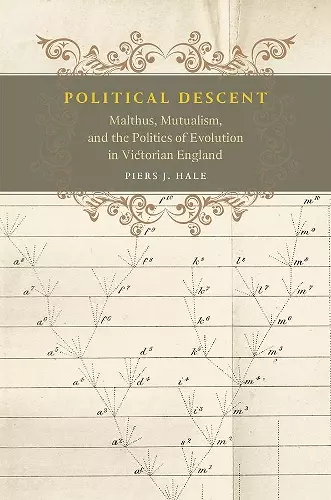Political Descent
Malthus, Mutualism, and the Politics of Evolution in Victorian England
Format:Hardback
Publisher:The University of Chicago Press
Published:2nd Sep '14
Currently unavailable, and unfortunately no date known when it will be back

Historians of science have long noted the influence of the nineteenth-century political economist Thomas Robert Malthus on Charles Darwin. In a bold move, Piers J. Hale contends that this focus on Malthus and his effect on Darwin's evolutionary thought neglects a strong anti-Malthusian tradition in English intellectual life, one that not only predated the 1859 publication of the Origin of Species but also persisted throughout the Victorian period until World War I. Political Descent reveals that two evolutionary and political traditions developed in England in the wake of the 1832 Reform Act: one Malthusian, the other decidedly anti-Malthusian and owing much to the ideas of the French naturalist Jean Baptiste Lamarck. These two traditions, Hale shows, developed in a context of mutual hostility, debate, and refutation. Participants disagreed not only about evolutionary processes but also on broader questions regarding the kind of creature our evolution had made us and in what kind of society we ought therefore to live. Significantly, and in spite of Darwin's acknowledgement that natural selection was "the doctrine of Malthus, applied to the whole animal and vegetable kingdoms," both sides of the debate claimed to be the more correctly "Darwinian." By exploring the full spectrum of scientific and political issues at stake, Political Descent offers a novel approach to the relationship between evolution and political thought in the Victorian and Edwardian eras.
"In his exploration of the crucial role of Malthusian thought in the evolutionary theory of liberal radicalism, Hale has provided scholars with a sort of sequel to Adrian Desmond's Politics of Evolution. Impressive in its scope, Political Descent is a bold and exciting book." (Bernard Lightman, editor of Victorian Science in Context)"
ISBN: 9780226108490
Dimensions: 24mm x 16mm x 3mm
Weight: 765g
464 pages